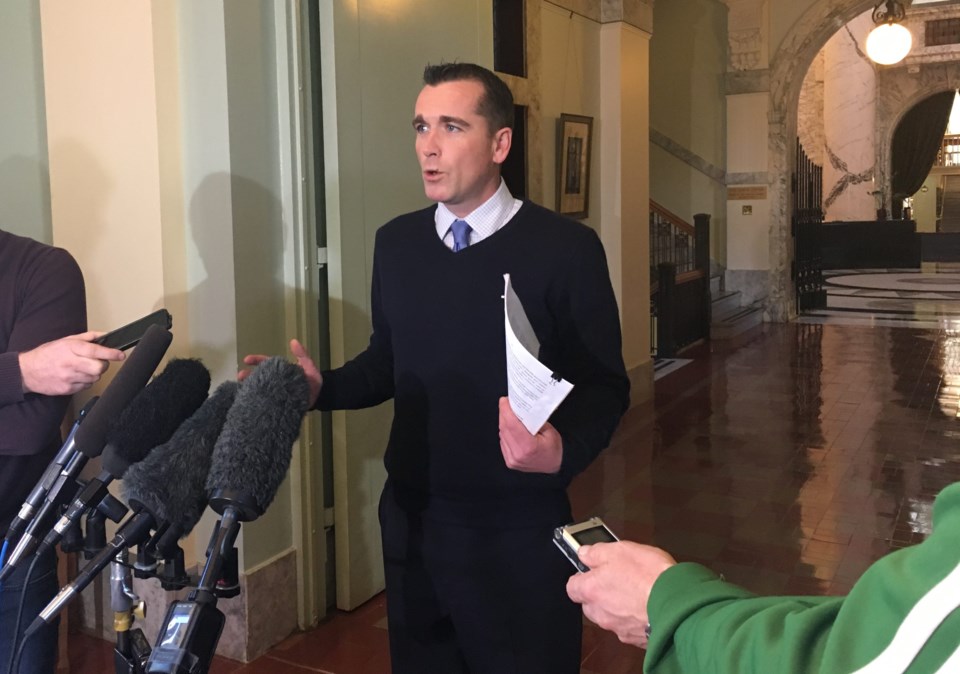When history is being made every day, it’s easy to miss small milestones along the way – both good and bad.
Last month, an eventful 48 hours in the Legislature kicked off when BC Liberal and Official Opposition Leader Andrew Wilkinson observed Speaker Darryl Plecas’ Chief of Staff Alan Mullen and an unnamed contractor emerging from offices, during what would later be described as “securing the data” on computer hard drives of Legislature employees, including Deputy Clerk Kate Ryan-Lloyd.
In a subsequent interview with Mike Smyth, Mullen had words for Wilkinson:
“I find Mr. Wilkinson’s behaviour disgraceful with a capital D. Absolutely disgraceful. He felt it appropriate to be running around the halls of the Legislature at 10 o’clock at night taking pictures on his cellphone of me. That’s an attempt at intimidation or bullying.”
Perhaps the unusual has become so usual in BC politics that the significance of this was lost. There simply aren’t any Canadian precedents for a Speaker or their staff making these kind of public comments, much less a war of words with an elected member – or the Leader of the Opposition.
Asked for clarification, Mullen says those comments were not partisan:
“I don't see how it can be construed as a political comment. I didn't say he was a disgrace, I said I find his behavior disgraceful with a capital D.”
Whatever your assessment of the personalities in this conflict, there’s no denying Plecas and Mullen have become public figures, and the relationship between them and the Official Opposition has descended into open hostility - and that this situation is far, far from ideal. Because as several veterans of the Speaker’s role attest, the Speaker’s Office is expected to remain impartial and above the fray.
Peter Milliken presided over the House of Commons for 10 years, for three prime ministers and some tenuous minority parliaments.
“I can’t recall any incident where [staff] used words they shouldn’t have and got into some media dispute, or argument about it,” says Milliken, “it certainly would have been embarrassing for me had that happened."
"You don’t do that. The Speaker’s Office has to stay neutral like the Speaker, I think.”
John Reynolds served as Speaker of BC’s Legislative Assembly from 1987 to 1989 during some wild years under Premier Vander Zalm, and went on to become Leader of the Opposition in Ottawa. He agrees the Speaker and their office must remain non-partisan:
“It’s crucial to remain non-partisan [as Speaker]. I was one of the most partisan guys there are, but that all stops when you become Speaker.”
Canada’s newest Speaker is Alberta’s Nathan Cooper. He’s only been sitting in the big chair since May 21, but agrees that impartiality and fairness are the single most crucial parts of the job.
“It’s imperative that the Speaker build strong relationships with the Leader of the Opposition or [other MLAs],” says Cooper, “it’s important that when there’s disagreements, they are dealt with privately and in a way that will build mutual respect.”
As for giving interviews, Mullen says his particular situation is different, and he’s simply doing what’s asked of him:
“As Chief of Staff it's right in my job description to conduct media interviews, to give media releases, and to give statements.”
Mullen says he’s suffered personal attacks since becoming a public figure in November – and rejects any suggestion he has made any partisan political comments whatsoever.
“With regards to making political statements…the current Speaker and I are not partisan,” says Mullen, “it would be highly inappropriate for [Plecas] or any Speaker or any member of their staff to be in any way politicizing things. Not once have I politicized anything.”
As for comments calling Wilkinson’s behaviour a “disgrace,” Mullen mentioned a subsequent interview where Wilkinson said Mullen “has no qualifications in life, whatsoever,” saying he found those remarks disrespectful – but as he admitted, those comments came after Mullen called his behaviour a disgrace.
Like Milliken and Reynolds, Cooper was careful to avoid commenting specifically on the unique and evolving situation in British Columbia, but on the role of the Speaker and their office.
“A good Speaker is like a good referee: very close to the action; but [isn’t] the action. It’s about the members, it’s not about the Speaker,” says Cooper.
As for putting Mullen in a situation where he’s expected to give interviews – much less calling the Leader of the Opposition’s behaviour a “disgrace” – all three Speakers agree this situation is best avoided.
“I wouldn’t want my staff getting involved in anything like that,” said Milliken.
Reynolds agrees that non-partisanship must extend to Speaker’s offices and staff:
“Yes – right down to my constituency assistants. Once I became Speaker, I [told them] ‘that’s all over now.’”
“I don’t want to detract from important debate in the house, certainly myself or my staff shouldn’t be injecting ourselves into any of that,” agrees Cooper.
“My staff is very clear on the expectations. We work in a very political environment. They may have held certain views prior to arriving at the Speaker’s Office but they need to conduct themselves in a manner that is non-partisan and brings dignity to the office of the Speaker,” says Cooper.
Milliken went one step further, saying for him, the incident likely would have been a firing offence.
“I suppose, yes. There would have been some trouble about it, that’s for sure.”
Maclean Kay is Editor-in-Chief of The Orca



